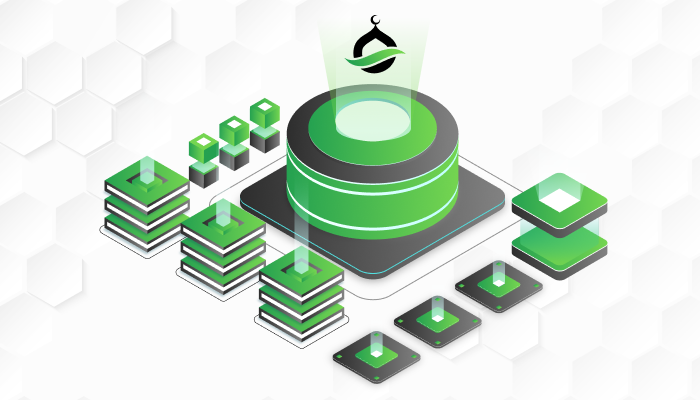
Imagine a future where Islamic finance and blockchain technology come together, creating a harmonious partnership based on ethical principles, transparency, and equity. Together, they could revolutionise the financial system and pave the way for a brighter, more equitable future. Let’s delve deeper into this exciting possibility.
Basics of Blockchain in Islamic Finance
Integrating blockchain technology in the Shariah-based banking system represents a significant leap towards more open, secure, and effective financial operations. Islamic banking, which abides by Shariah law, has frequently encountered difficulties with compliance, documentation, and transaction processing speed.
With the arrival of blockchain technology, this sector has the potential to undergo a revolution that addresses these issues head-on. The immutable blockchain ledger system enhances accountability and trust, in line with the Islamic principles of fairness and transparency.
The question many ask, especially those new to blockchain and Islamic blockchain is; “Is blockchain halal?”
Islamic finance incorporates shariah law in all its transactions. This raises the question of whether blockchain technology aligns with the principles of halal (permissibility) in Islam.
While scholars have debated this topic, many believe that blockchain technology can be considered halal as long as it does not facilitate activities that are prohibited in Islam, such as gambling or interest-based transactions. This shows that blockchain can be embraced in Islamic finance, provided it adheres to the principles of shariah law.
Learn About CAIZ Sharia Certificates
Enhancing Trust and Transparency with Blockchain
The conventional finance system has faced challenges of being unclear, vulnerable to deceit and manipulation. The introduction of blockchain technology has paved the way for complete transparency, where all transactions are visible to all parties involved. This not only strengthens the trust among stakeholders but also aligns with the fundamental Islamic values of truthfulness and facilitates smoother regulatory supervision.
The Benefits of Blockchain In Islamic Finance
There are numerous advantages of incorporating blockchain technology in the domain of Islamic finance. These benefits include:
- Increased Efficiency: By leveraging blockchain technology, financial processes can be automated and intermediaries eliminated, resulting in significantly faster and more efficient transactions.
- Enhanced Transparency: Blockchain creates an immutable record of all transactions, ensuring transparency and promoting accountability in Islamic finance.
- Cost Savings: Embracing advanced technology and streamlining operational processes can bring about tremendous cost savings for Islamic banks and financial institutions by removing intermediaries and manual procedures.
- Improved Security: Blockchain is a more secure option compared to traditional systems because of its advanced cryptography techniques used to secure data.
- Shariah Compliance: Blockchain technology can be tailored to meet Shariah law requirements, making it a suitable solution for Islamic finance institutions.
Smart Contracts in Sharia-Compliant Financing
Smart contracts can revolutionise Islamic finance by bringing about greater transparency, trust, and compliance with Shariah law. By leveraging the benefits of blockchain technology, smart contracts can streamline business processes, reduce ambiguity, and automate contractual obligations.
They offer a secure, immutable, and easily verifiable way to manage financial transactions, while also reducing credit risk and improving risk management. With smart contracts, Islamic financial institutions can attract international customers, boost their profitability, and enhance their reputation in the industry. By embracing this technology, we can unlock the full potential of Islamic finance and create a brighter future for all stakeholders.
The Role of Blockchain in Zakat and Islamic Charities
Zakat is a significant Islamic finance term that highlights the responsibility of an individual to donate a certain proportion of their wealth each year to charitable causes. This act of giving is mandatory for all Muslims in most countries and is considered a form of worship. It is believed that donating money to the poor helps to purify annual earnings that exceed an individual’s essential needs, providing them with an opportunity to share their wealth and contribute to society’s betterment.
The adoption of blockchain technology in Zakat collection and distribution can bring about significant improvements in transparency and the efficient allocation of funds towards the deserving beneficiaries. Additionally, the use of blockchain in Islamic charities can lead to secure and trackable donations, building trust and accountability among donors and beneficiaries alike.
Overcoming Challenges in Blockchain Implementation
While blockchain technology carries great potential, certain challenges still need to be addressed. It is important for Sharia scholars to examine digital asset applications in order to allay concerns carefully.
Additionally, scalability, regulatory frameworks, and technical expertise require thoughtful consideration. Collaboration between financial institutions, Sharia scholars, and tech experts will be crucial in overcoming these obstacles and unlocking the full potential of blockchain technology.
Learn about the CAIZ Ecosystem here.
Future Trends: Blockchain in Islamic Banking
The future of Islamic banking is full of exciting possibilities. Just imagine:
- Tokenised Sukuk: Using blockchain technology for fractional ownership of Islamic bonds allows a broader range of investors to participate in the market.
- Trade Finance: Experience a hassle-free and efficient trade finance process that minimises paperwork and accelerates cross-border transactions.
- Microfinance: Providing financial services that are affordable and accessible to communities that are underserved by traditional banking.
By harnessing the power of blockchain through meticulous planning and collective effort, we can unlock a future of finance that is transparent, ethical, and inclusive. This alignment with the fundamental principles of Islamic finance holds immense potential to revolutionise financial inclusivity and social responsibility, creating a brighter tomorrow for the entire global Islamic finance sector.